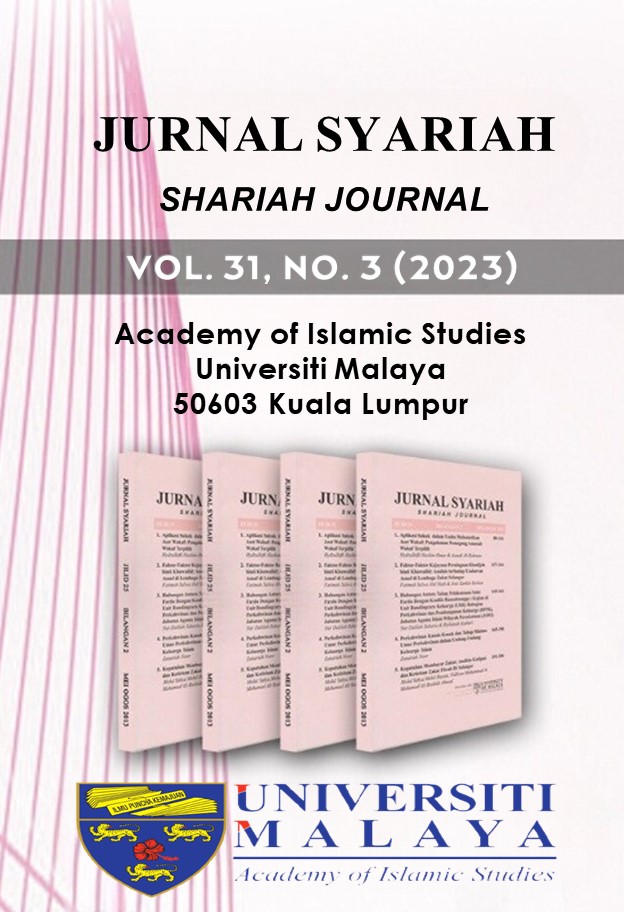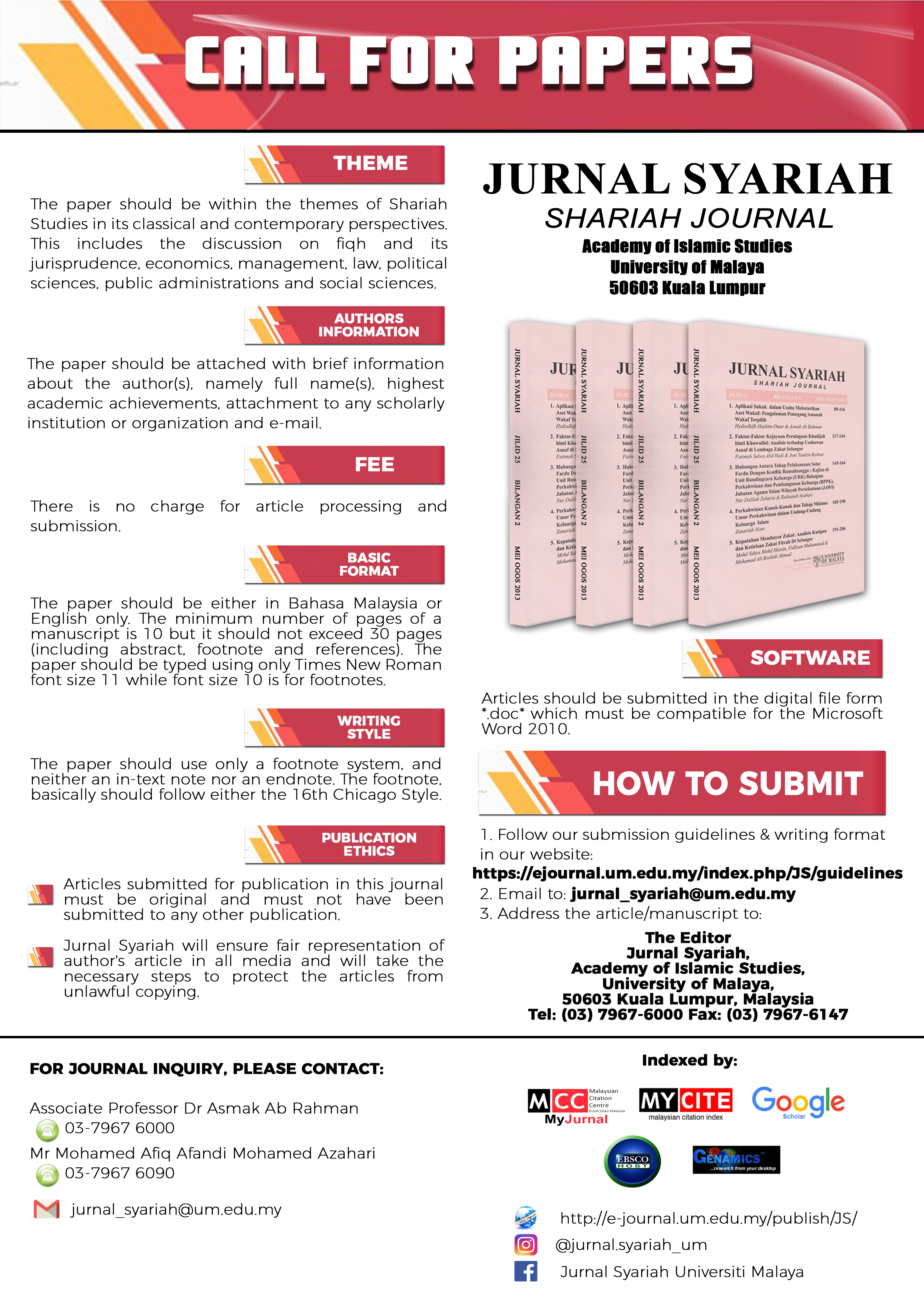HEALTHCARE WAQF AND SOCIO-ECONOMIC DEVELOPMENT IN INDONESIA: CASE STUDY OF HOSPITAL ROEMANI MUHAMMADIYAH
Keywords:
waqf, socio-economic development, healthcare, Islamic hospital, MuhammadiyahAbstract
The article describes a waqf-based hospital in Indonesia to show continuity and change in the development of waqf-based Islamic hospitals, which began in the Prophetic era and has survived until today. The findings show there are several transformations from waqf-based hospitals in medieval and early modern Islam where many of the founders, from the Sultan and the elites of the Islamic dynasty to the donors, come from the civil and private sector, for instance, Ḥājj Roemani, the founder of Hospital Roemani Muhammadiyah, an entrepreneur with the same background as Hakim Muhammad Said of Hamdard Pakistan. Also, there is a shift from what is called "free healthcare service to the needy and poor", which is generally understood as fully free, to the several features of changes ranging from a very nominal charge, reduction of the cost, and health insurance with low premiums subsidized by the state for the needy and poor. The shifting influence of the hospital management model towards a commercial, even though the hospital itself is waqf based, whose essential character is non-profit. We argue this is due to the human population growth and the challenges of the emergence of various diseases until the pandemic, increasing the need for health funds. Hence, the hybrid scheme of Islamic philanthropy funds is needed and can make this hospital an institution that not only plays a role in the socio-economic development in the health sector but extends to other socio-economic sectors.
Downloads
References
Agus Kusnadi et al., The Making Healthier of Indonesia: Celebrating 100 Years of Muhammadiyah Contribution (Jakarta: Majelis Pembina Kesehatan Umum (MPKU) PP Muhammadiyah, 2020)
Ahmed Dallal, ‘The Islamic Institution of Waqf: A Historical Overview,’ in Islam and Social Policy, ed. Stephen P. Heyneman (Nashville: Vanderbilt University Press, 2004)
Ahmad ‘Auf ‘Abd al-Rahman, Awqāf al-Ri‘āyah al-Ṣiḥiyah fī al-Mujtama‘ al-Islāmī (Qatar: Kitāb al-Ummah, 2007).
Ahmad ‘Isa, Tārīkh al-Bīmāristānāt fī al-Islām (Qahirah: Hindawi, 2012)
Ahmed Ragab, The Medieval Islamic Hospital: Medicine, Religion, and Charity (Cambridge University Press, 2015).
Alifah Ratnawati, Widiyanto Mislan Cokrohadisumarto & Noor Kholis, ‘Improving the Satisfaction and Loyalty of BPJS Healthcare in Indonesia: A Sharia Perspective,’ Journal of Islamic Marketing, vol. 12/7 (2020): 1316-1338, https://doi.org/10.1108/JIMA-01-2020-0005.
Akbariah Baqutayan, Shadiya Mohamed Saleh & Mohd. Mahdzir, ‘The Importance of Waqf in Supporting Healthcare Services,’ Journal of Science, Technology and Innovation Policy, vol. 4/1 (2018): 13-19.
Amelia Fauzia, Faith and the State: A History of Islamic Philanthropy in Indonesia (Leiden, Boston: Brill, 2013).
———. ‘Penolong Kesengsaraan Umum: The Charitable Activism of Muhammadiyah During the Colonial Period,’ South East Asia Research, vol. 25/4 (2017): 379-394.
Amin Mohseni-Cheraghlou, Ramezan Ali Marvi & Amir Kazemzadeh, ‘Waqf in Iran: An Overview of Historical Roots and Current Trends,’ in Waqf Development and Innovation: Socio-Economic and Legal Perspectives, ed. Syed Nazim Ali & Umar A. Oseni (London: Routledge, 2021).
Azniza Hartini Azrai Azaimi Ambrose, Mohamed Aslam Gulam Hassan & Hanira Hanafi, ‘A Proposed Model for Waqf Financing Public Goods and Mixed Public Goods in Malaysia,’ International Journal of Islamic and Middle Eastern Finance and Management, vol. 11/3 (2018): 395-415, https://doi.org/10.1108/IMEFM-01-2017-0001.
Barae Dukhan, Mustafa Omar Mohammed & Mohamed Cherif El Amri, ‘Contributions of Waqf Investments in Achieving SDGs,’ in Islamic Wealth and the SDGs Global Strategies for Socio-Economic Impact, ed. Mohd Ma’Sum Billah (Palgrave: New York, 2022).
Benoît Challand, ‘A Nahda of Charitable Organizations? Health Service Provision and the Politics of Aid in Palestine,’ International Journal of Middle East Studies, vol. 40/2 (2008): 227-247, https://doi.org/10.1017/S0020743808080525.
Burhani, Ahmad Najib. “Muhammadiyah.” Accessed September 5, 2021. http://www.oxfordislamicstudies.com/article/opr/t236/e0553
Don Eliseo III Lucero‐Prisno et al., ‘Top Ten Public Health Challenges to Track in 2022,’ Public Health Challenges, vol. 1/3 (2022): 1-10, https://doi.org/10.1002/puh2.21.
Eka Afrina Djamhari et al., Defisit Jaminan Kesehatan Nasional (JKN): Mengapa dan Bagaimana Mengatasinya? (Jakarta: Perkumpulan Prakarsa, 2020), 67-68, https://repository.theprakarsa.org/media/302060-defisit-jaminan-kesehatan-nasional-jkn-m-4c0ac9c6.pdf.
Emily Gee & Thomas Waldrop, Policies to Hold Nonprofit Hospitals Accountable (Washington D.C.: The Center for American Progress, 2022), https://www.americanprogress.org/article/policies-to-hold-nonprofit-hospitals-accountable/.
Fahmi Medias et al., ‘A Systematic Literature Review on the Socio-Economic Roles of Waqf: Evidence from Organization of the Islamic Cooperation (OIC) Countries,’ Journal of Islamic Accounting and Business Research, vol. 13/1 (2021): 177-193, https://doi.org/10.1108/JIABR-01-2021-0028.
Fathima Begum Syed Mohideen et al., ‘Waqf Concept Health Clinic-‘Uniqueness in Disguise’ USIM Experience,’ Malaysian Journal of Science Health & Technology, vol. 7/2 (2021): 54-57, https://doi.org/10.33102/mjosht.v7i2.211
Franz Kogelmann, ‘Sidi Fredj: A Case Study of a Religious Endowment in Morocco under the French Protectorate,’ in Social Welfare in Muslim Societies in Africa, ed. Holger Weiss (Stockholm: Nordiska Afrikainstitutet, 2002).
G. Hussein Rassool, ‘The Crescent and Islam: Healing, Nursing and the Spiritual Dimension. Some Considerations towards an Understanding of the Islamic Perspectives on Caring,’ Journal of Advanced Nursing, vol. 32/6 (2000): 1476-1484, https://doi.org/10.1046/j.1365-2648.2000.01614.x.
Greget Kalla Buana, ‘Waqf Can Help Promote Inclusive Economy,’ The Jakarta Post, 18October 2018, https://www.thejakartapost.com/academia/2018/10/26/waqf-can-help-promote-inclusive-economy.html.
Haedar Nashir, Muhammadiyah a Reform Movement (Surakarta: Muhammadiyah University Press, 2015).
Hendri Tanjung Ascarya, ‘Structures of Healthcare Waqf in Indonesia to Support SDGs,’ in Islamic Wealth and the SDGs, ed. Mohd Ma’sum Billah (New York: Springer, 2021).
Henry B. Hansmann, ‘The Role of Nonprofit Enterprise,’ The Yale Law Journal, vol. 89/5 (1980): 835, https://doi.org/10.2307/796089.
Hilman Latief, Melayani Umat Filantropi Islam dan Ideologi Kesejahteraan Kaum Modernis (Jakarta: Gramedia, 2010).
Hilman Latief, ‘Health Provision for the Poor: Islamic Aid and the Rise of Charitable Clinics in Indonesia,’ South East Asia Research, vol. 18/3 (2010): 503-553, https://doi.org/10.5367/sear.2010.0004
Hussah Hindi Shuja Alotaibi, ‘A Review on the Development of Healthcare Infrastructure through the History of Islamic Civilization,’ Journal of Healthcare Leadership, vol. 13 (2021): 139-145.
Ibrahim Abiodun Oladapo & Asmak Ab Rahman, ‘Re-Counting The Determinant Factors of Human Development,’ Humanomics, vol. 32/2 (2016): 205-226.
Janine A. Clark, Islam, Charity and Activism: Middle-Class Networks and Social Welfare in Egypt, Jordan, and Yemen (Bloomington: Indiana University Press, 2004).
Jonathan Benthall, ‘Financial Worship: The Quranic Injunction to Almsgiving,’ The Journal of the Royal Anthropological Institute, vol. 5/1 (1999): 27, https://doi.org/10.2307/2660961.
Joseph Schacht, ‘Early Doctrines on Waqf,’ Fuad Köprülü Armagani (Istanbul), vol. 1953: 443-452.
Khālid ‘Abd Allah Shu‘ayb, Al-Naẓārah ‘ala al-Waqf (Kuwayt: al-Amānah al-‘Ammah li al-Awqāf, 2006).
Mahendradhata Y. et al., ‘The Republic of Indonesia Health System Review,’ Health Systems in Transition, vol. 7/1 (2017).
Michael E. Porter, ‘What Is Value in Health Care?,’ New England Journal of Medicine, vol. 363/26 (2010): 2477-2481, https://doi.org/10.1056/nejmp1011024.
Miri Shefer-Mossensohn, ‘Charity and Hospitality Hospitals in the Ottoman Empire in the Early Modern Period,’ in Poverty and Charity in Middle Eastern Contexts, ed. Michael Bonner et al. (New York: State University of New York Press, 2003).
———. Ottoman Medicine: Healing and Medical Institutions 1500-1700 (New York: State University of New York Press, 2010).
———. ‘The Many Masters of Ottoman Hospitals: Between the Imperial Palace, the Harem, Bureaucracy, and the Muslim Law Courts,’ Turkish Historical Review, vol. 5/1 (2014): 94-114, https://doi.org/10.1163/18775462-00501010.
Mohammed Ali Shariff & Zainab Fida Ahsan, ‘Waqf Development In India,’ in Waqf Development and Innovation Socio-Economic and Legal Perspectives, ed. Syed Nazim Ali & Umar A. Oseni (New York: Routledge, 2022).
Mohammed K. Alshaleel, ‘Islamic Finance, Sustainable Development and Developing Countries,’ in Corporate Social Responsibility in Developing and Emerging Markets, ed. Onyeka Osuji, Franklin N. Ngwu & Dima Jamali (Cambridge University Press, 2020).
Monzer Kahf, Al-Waqf al-Islāmī Tutawwuruhu Idāratuhu wa Tanmiyyatuhu (Damascus: Dār al-Fikr, 2000).
———. ‘Financing the Development of Awqaf Property,’ American Journal of Islam and Society, vol. 16/4 (1999): 39-66, https://doi.org/https://doi.org/10.35632/ajis.v16i4.2099.
Monzer Kahf & Siti Mashitoh Mahamood (eds), Essential Readings in Contemporary Waqf Issues (Kuala Lumpur: CERT Publications, 2011).
Mukhtarom, ‘RS. Roemani Nyaris Berhenti Beroperasi Gara-gara BPJS Nunggak Rp 48 M’, Muhammadiyah Jawa Tengah, https://pwmjateng.com/rs-roemani-nyaris-berhenti-beroperasi-gara-gara-bpjs-nunggak-48-m/, accessed on 20 January 2023
Muhammad Fuad, ‘Civil Society in Indonesia: The Potential and Limits of Muhammadiyah,’ Journal of Social Issues in Southeast Asia, vol. 17/2 (2002): 133-163, https://doi.org/10.1355/sj17-2a.
Muḥammad ‘Ubayd al-Kabīsī, Ahkām al-Waqf fī al-Sharī‘ah al-Islāmiyyah (Baghdad: Maktabah al-Irshad, 1977).
Muhammad Yunus & Karl Weber, Building Social Business: The New Kind of Capitalism That Serves Humanity’s Most Pressing Needs (New York: Public Affairs, 2010).
Mustafā Ahmad al-Zarqā’, Ahkām al-Awqāf (Amman: Dār ‘Amār, 1997).
N.a, ‘History,’ Bezmialem Vakıf University Hastanesi, https://bezmialemdragoshastanesi.com/en/Pages/History.aspx, accessed on 20 January 2023.
N.a, ‘Rangkaian Klinik Waqaf An-Nur,’ Waqaf An-Nur, http://www.waqafannur.com.my/content/Rangkaian_klinik_Waqaf_An-Nur, accesed on 20 January 2023.
N.a, ‘Profile Rumah Sakit’, Kementerian Kesehatan Republik Indonesia, https://sirs.kemkes.go.id/fo/home/profile_rs/3374080, accessed on January 2023
Norizah Mohamed @ Haji Daud & Asmak Ab Rahman, ‘Wakaf Penjagaan Kesihatan: Kajian Kes di Hospital Waqaf an-Nur,’ Jurnal Syariah, vol. 23/3 (2015): 401-434.
Nurmala Selly Saputri & Sri Murniati, Laporan Penelitian SMERU No. 1/2023: Kajian Dampak Bantuan Iuran Program Jaminan Kesehatan pada Masyarakat Miskin dan Tidak Mampu (Jakarta: The SMERU Research Institute, 2022), http://repository.unair.ac.id/id/eprint/17554.
Raditya Sukmana, ‘Critical Assessment of Islamic Endowment Funds (Waqf) Literature: Lesson for Government and Future Directions,’ Heliyon, vol. 6/10 (2020).
Raja Aishah Raja Adnan, Mahazan Abdul Mutalib & Muhammad Ridhwan Ab Aziz, ‘Factors Necessary for Effective Corporate Waqf Management for Malaysian Public Healthcare,’ ISRA International Journal of Islamic Finance, vol. 14/1 (2022): 73-88, https://doi.org/10.1108/IJIF-11-2019-0178
Ra’ed Bani Essa & Amer Al-Otoum, ‘Waqf in Islam and Its Role in the Health Field with Reference to the Case of Jordan,’ Jerash for Research and Studies Journal, vol. 23/2 (2022).
Rio Erismen Armen, Nabillah Fauziah Kuswendah & Asmuliadi Lubis, ‘Management of Productive Waqf in Achmad Wardi Eye Hospital of BWI-DD in Serang Banten,’ IMARA: Journal of Islamic and Economic Research, vol. 6/2 (2022): 39-57.
Rosalia Sciortino, Neni Ridarineni & Brahmaputra Marjadi, ‘Caught between Social and Market Considerations: A Case Study of Muhammadiyah Charitable Health Services,’ Reproductive Health Matters, vol. 18/36 (2010): 25-34, https://doi.org/10.1016/S0968-8080(10)36528-1.
Rusni Hassan & Khairul Fikry Jamaluddin, ‘Waqf to Support Healthcare Wellbeing Mission: The Proposed Model for Corporate Waqf for Healthcare (CWFH),’ in Towards a Post-Covid Global Financial System, ed. M. Kabir Hassan, Aishath Muneeza & Adel M. Sarea (Bingley: Emerald Publishing, 2022).
Samantha Artiga & Elizabeth Hinton, ‘Beyond Health Care: The Role of Social Determinants in Promoting Health and Health Equity,’ Kaiser Family Foundation, Issue Brief (May 2018), https://www.kff.org/racial-equity-and-health-policy/issue-brief/beyond-health-care-the-role-of-social-determinants-in-promoting-health-and-health-equity/.
Samuel R. Weber & Kenneth I. Pargament, ‘The Role of Religion and Spirituality in Mental Health,’ Current Opinion in Psychiatry, vol. 27/5 (2014): 358-363.
Sandy A. Johnson, Challenges in Health and Development: From Global to Community Perspectives, 2nd ed. (Switzerland: Springer, 2017), https://doi.org/10.1007/978-3-319-53204-2.
Sheila Nu Nu Htay, Nur Shazwani Sadzali & Hanudin Amin, ‘An Analysis of the Viability of Micro Health Takaful in Malaysia,’ Qualitative Research in Financial Markets, vol. 7/1 (2015): 37-71, https://doi.org/10.1108/QRFM-09-2013-0030.
Siswanto et al., Bunga Rampai Kinerja Pembangunan Kesehatan di Indonesia: Tantangan, Masalah, dan Solusi (Jakarta: Badan Penelitian dan Pengembangan Kesehatan Kementerian Kesehatan RI, 2020).
Sulistyowati et al., ‘Issues and Challenges of Waqf in Providing Healthcare Resources,’ Islamic Economic Studies, vol. 30/1 (2022): 2-22, https://doi.org/10.1108/ies-09-2021-0034.
Susumu Nejima, ‘Evolution of a Waqf-Based NGO: Hamdard Foundation in Pakistan,’ in NGOs in the Muslim World: Faith and Social Services, ed. Susumu Nejima (London: Routledge, 2017).
Vika Annisa Qurrata et al., ‘The Implementation and Development of Productive Waqf in Indonesia: Case at Malang Islamic Hospital,’ Humanities and Social Sciences Reviews, vol. 7/4 (2019): 533-537, https://doi.org/10.18510/hssr.2019.7471.
Virginia Braun & Victoria Clarke, ‘Using Thematic Analysis in Psychology,’ Qualitative Research in Psychology, vol. 3/2 (2006): 77-101, https://doi.org/10.1191/1478088706qp063oa.
Wahbah al-Zuḥaylī, Al-Fiqh al-Islāmī wa Adillatuhu (Damshiq: Dār al-Fikr, 2004).
Wan Abdul Fattah Wan Ismail et al., ‘Implementation of Healthcare Waqf: A Case Study of Universiti Sains Islam Malaysia’s Health Specialist Clinic,’ Al-Shajarah: Journal of Islamic Thought and Civilization, no. Special Issue (2019): 125-148.
Yasser Tabbaa, ‘The Functional Aspects of Medieval Islamic Hospitals,’ in Poverty and Charity in Middle Eastern Contexts, ed. Michael Bonner et. al (New York: State University of New York Press, 2003).
Downloads
Published
How to Cite
Issue
Section
License
Copyright (c) 2024 Jurnal Syariah

This work is licensed under a Creative Commons Attribution-NonCommercial 4.0 International License.
COPYRIGHT: All rights reserved. Not allowed to be reproduced any part of articles and contents of this journal in any form or by any way, whether electronic, mechanical, photocopying, recording or otherwise without permission in writing from the Chief Editor, Jurnal Syariah.



















